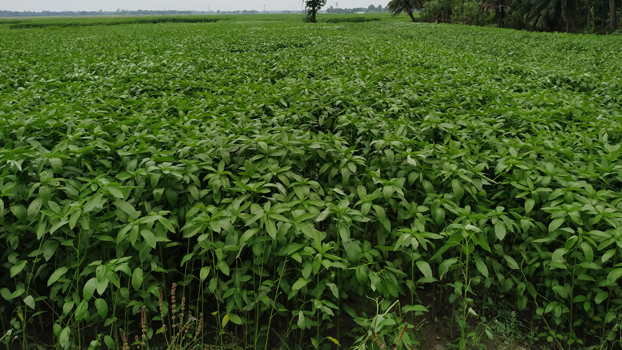Jute cultivation getting popular in Chatmohar
Fair price, govt support come as motivation for jute growers


Over the last two years, the scope of jute farming in Pabna’s Chatmohar Upazila has increased due to the good price of jute and the government's support to farmers in expanding jute cultivation.
In the last season, different varieties of jute were cultivated on 8,100 hectares of land in 11 unions and one municipal area of Chatmohar. Jute has been cultivated on 8,720 hectares of land this season. Of these, 135 hectares are Desi jute, 8,445 hectares are Tosha jute and 140 hectares are Mesta jute. Jute has been cultivated on 620 hectares of land more this year as compared to last year.
Although the Upazila Agriculture Office oversees the overall issue of the jute cultivation, the District Jute Development Officer of the Jute Department and the Upazila Deputy Assistant Jute Development Officer are working to expand jute cultivation in the area. Bachchu Mia, Deputy Assistant Jute Development Officer working in Chatmohar, said that the number of jute farmers registered in Chatmohar under the Jute Department is 500.
Under the project titled Production and Expansion of Advanced Technology Based Jute and Jute Seeds implemented by the Jute Department, 2400 kg of Robi-1 variety of jute seeds and 85 kg of jute seeds of 9897 varieties produced at farmer level were distributed free of cost among 2485 farmers of Chatmohar in the financial year 2020-21. Farmers receiving jute seeds were also given 6 kg urea, 3 kg TSP and 3 kg potash fertilizer free of cost.
At the end of last year, during the seed production season, free fertilizer seeds and pesticides were distributed among 330 farmers for seed production on 10 decimal of land. Seeds were produced in Haripur, Dibigram, Parshadanga Union of the upazila. Soon 100 jute farmers will be trained to improve their skills in jute cultivation. The work of adding new names by cutting the names of those farmers who have died among the listed farmers is in process, he added.
Talking to jute farmers, it is learned that the present jute farmers are clearing weeds to eat jute. Jute farming on one Bigha of land including cultivation, seeds, fertilizers, weeding, cutting and weeding costs about 11 to 12 thousand taka. The average yield per Bigha is about 8 mounds. Jute sticks worth around Tk 2,000 per Bigha can also be received from the same amount of land.
Last year, jute was sold at Tk 2,000 per quintal during the mass season, but the price of jute gradually increased later. Those who sold their produced jute during the mass season earned Tk 6,000 to 7,000 per Bigha. However, those who sold it much later reaped a profit of around Tk 20,000 per Bigha.
District Jute Development Officer Mamunur Rashid said there is no alternative to jute products to maintain the balance of the environment. The government has paid special attention to increase the production of jute and manufacture jute products. Farmers are also getting a fair price for jute. In this situation jute seeds are being produced locally in Chatmohar.
A few days ago, the Jute Department purchased 85 kg of jute seeds from the farmers at the rate of Tk 200 per kg and distributed them among the farmers free of cost. It is often raining and the weather has been quite hot now which helps Jute growth well. If we can motivate the farmers to cultivate jute and if the market price of jute is good, the good days of jute farming will return once again and the farmers will benefit from it.
If the use of jute products in the world increases further, the jute industry known as golden fiber will expand further, the official added.



